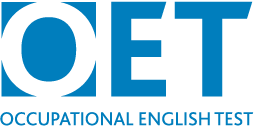Test of English as a Foreign Language is a standardized test to measure the English language ability of non-native speakers wishing to enroll in English-speaking universities. The test is accepted by more than 11,000 universities and other institutions in over 190 countries and territories. TOEFL is one of several major English-language tests worldwide, including IELTS, Duolingo English Test, Cambridge Assessment English, and Trinity College London exams.

The International English Language Testing System is an international standardized test of English language proficiency for non-native English language speakers. It is jointly managed by the British Council, IDP and Cambridge English, and was established in 1989. IELTS is one of the major English-language tests in the world. The IELTS test has two modules: Academic and General Training. IELTS One Skill Retake was introduced in 2023, which allows a test taker to retake any one section of the test.

CELTA is an initial teacher training qualification for teaching English as a second or foreign language (ESL and EFL). It is provided by Cambridge Assessment English through authorised Cambridge English Teaching Qualification centres and can be taken either full-time or part-time. CELTA was developed to be suitable both for those interested in Teaching English as a Foreign Language (TEFL) and for Teaching English to the Speakers of Other Languages (TESOL). The full name of the course was originally the Certificate in English Language Teaching to Adults and is still referred to in this way by some course providers. However, in 2011 the qualification title was amended on the Ofqual register to the Cambridge English Level 5 Certificate In Teaching English to Speakers of Other Languages (CELTA) in order to reflect the wider range of students that teachers might have, including younger learners.
Cambridge Assessment English or Cambridge English develops and produces Cambridge English Qualifications and the International English Language Testing System (IELTS). The organisation contributed to the development of the Common European Framework of Reference for Languages (CEFR), the standard used around the world to benchmark language skills, and its qualifications and tests are aligned with CEFR levels.

Cambridge English: Young Learners, also known as Young Learners English Tests (YLE), is a suite of English language tests specially designed for children in primary and lower-secondary school. The tests are provided by Cambridge English Language Assessment.
B1 Preliminary, previously known as Cambridge English: Preliminary and the Preliminary English Test (PET), is an English language examination provided by Cambridge Assessment English.

The Occupational English Test is an English language test that assesses the English language proficiency of overseas-trained healthcare professionals seeking to register and practise in an English-speaking environment.
C2 Proficiency, previously known as Cambridge English: Proficiency and the Certificate of Proficiency in English (CPE), is an English language examination provided by Cambridge Assessment English (previously known as Cambridge English Language Assessment and University of Cambridge ESOL examination).
C1 Advanced, previously known as Cambridge English: Advanced and the Certificate in Advanced English (CAE), is an English language examination provided by Cambridge Assessment English (previously known as Cambridge English Language Assessment and the University of Cambridge ESOL examination).
B2 First, previously known as Cambridge English: First and the First Certificate in English (FCE), is an English language examination provided by Cambridge Assessment English (previously known as Cambridge English Language Assessment and the University of Cambridge ESOL examinations).
Trinity College London, established in 1872, is a leading international exam board, publisher and independent education charity. Since 1938 Trinity has been offering English language assessments taken by over 850,000 candidates in over 60 countries each year.
The European Language Certificates are international standardised tests of ten languages.
A2 Key, previously known as Cambridge English: Key and the Key English Test (KET), is an English language examination provided by Cambridge Assessment English.
The Cambridge English Scale is a single range of scores used to report results for Cambridge English Language Assessment exams. It was introduced in January 2015, with Cambridge English Scale scores replacing the standardised score and candidate profile used for exams taken pre-2015. The scale aims to provide exam users with more detailed information about their exam performance than was previously available.
IELTS Life Skills is an English language test which provides proof of English speaking and listening skills at Common European Framework of Reference for Languages (CEFR) levels A1, A2 or B1. It can be used to apply for a 'family of a settled person' visa, visa extension, indefinite leave to remain or citizenship in the UK.
The Michigan English Test (MET) is a multilevel, modular English language examination, which measures English language proficiency in personal, public, occupational and educational contexts. It is developed by CaMLA, a not-for-profit collaboration between the University of Michigan and the University of Cambridge and has been in use since 2008.
The Examination for the Certificate in Competency in English (ECCE) is a high-intermediate level English language qualification that focuses on Level B2 of the Common European Framework of Reference for Languages (CEFR).
Cambridge English Qualifications are a graduated series of exams designed to assess competency in English for learners of English as a second or foreign language. The Cambridge English Qualifications are based on the candidate's scoring on the Cambridge English Scale which is a single range of scores used to report results for Cambridge English Language Assessment exams. It was introduced in January 2015, with Cambridge English Scale scores replacing the standardised score and candidate profile used for exams taken pre-2015. The scale aims to provide exam users with more detailed information about their exam performance than was previously available.
The Oxford Test of English (OTE) is an on demand computer-adaptive test of English proficiency for non-native speakers of English, reporting at A2, B1, and B2 levels of the Common European Framework of Reference (CEFR). The test was developed by Oxford University Press (OUP) to provide learners of English with a quick, reliable way to prove their level of English proficiency for university entrance, employment and travel. The test is certified by the University of Oxford and is available worldwide.



